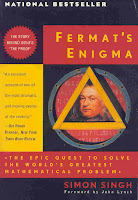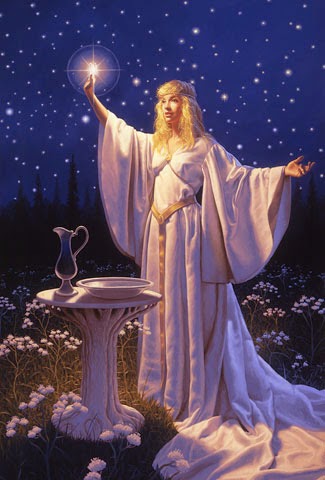Youngblood: Faith and reason
 |
| Fermat's Enigma by Simon Singh |
(Click here for a brief explanation on Fermat's Last Theorem)
First, not everything in science has a proof. In fact, the whole of math, an abstract branch of science, is founded on statements that are so fundamental that they do not have proofs! These statements, called axioms, are either self-evidently true or else are assumed to be true.
Persons who espouse the philosophy of scientism accept only assertions that are supported by scientific proof. For this reason, they reject dogmas of faith. "Prove it to me!" they demand. "I could prove to you this mathematical theorem, can you prove to me that dogma in a similar way?"
But their challenge is empty of meaning, for not everything in science has a proof.
Second, scientific proof always contains at least a tiny element of doubt. Singh explains: "Scientific theory is merely considered highly likely based on observation and perception, both of which are fallible and provide only approximations to the truth. Science is operated according to the judicial system. A theory is assumed to be true if there is enough evidence to prove it 'beyond all reasonable doubt.'"
As example, he related scientists' continual search for the basic building blocks of the universe — from the atoms of the 19th century up to present research on quarks. He shows how one theorem could be refined by another or, at times, completely replaced. Singh then explains that mathematical proofs, on the other hand, are built on axioms and logic, such that, "if the axioms are correct and the logic is flawless, then the conclusion will be undeniable."
Knowledge from math then is more stable than that from science. This is because math, unlike science, is not subject to the level of inaccuracy that comes from the observation of matter. Instead, knowledge is abstracted from matter. But knowledge from faith is even more stable than knowledge from math. It comes neither from observation nor abstraction of matter. It comes directly from God, who can neither deceive nor be deceived.
Now, this is very interesting. If math, the strictest of all branches of science, admits it cannot prove everything, then it follows that science, to a greater extent, cannot prove everything. Thus, the foundation of scientism crumbles!
But even without Godel's discovery, we should have arrived at the same conclusion. Man does not have a perfect knowledge of himself, even from a biological point of view. Mapping out the human genome is just the beginning of an enormous biological puzzle. So could he dare claim that he could explain everything in the universe?
Finally, a great part of science is founded on faith. In order to prove Fermat's Last Theorem, Andrew Wiles had to rely on the contributions of many great mathematicians before him. He did not try to prove again all of their theorems. Instead, he believed that their theorems were correct. He placed his faith, his human faith, in them.
 |
| Andrew Wiles |
It is not my intention to discredit science and math. The world has made significant progress because of them. But we cannot be deceived into thinking that they provide the answer to all questions. There are many questions that can only be answered by God. In fact, He has already answered some of them through the truths He has revealed.
We have to accept these truths even though we may not completely understand them. They are not unreasonable; rather, they are beyond reason. They are true not because we understand them but because they were revealed by God, the fullness of truth Himself.
Published on page A15 in the Young Blood section of the July 09, 2005 issue of the Philippine Daily Inquirer.
Like Asymptotes on Facebook : http://www.facebook.com/Asymptotes
Follow Asymptotes on Blogger: Join Asymptotes Blogger site
*****
Follow Asymptotes on Twitter: @_asymptotes_





"We have to accept these truths even though we may not completely understand them. They are not unreasonable; rather, they are beyond reason. They are true not because we understand them but because they were revealed by God, the fullness of truth Himself."
ReplyDeleteI thought the same two years ago, when I first entered college. But then I was suffering from bounded rationality back then. Man may not be able to know everything, for our knowledge and intellect are bounded to a universe confined only to our human perception and understanding; so you see, we cannot even define the limits of the knowledge that is attainable- the 'knowable bounds'. 'Everything' is a vague word- for it is a universe consisting of the sets of known, unknown, imagined and indeterminate entities.
I cannot be certain then, I thought to myself, that a God exists. I am arrogant if I say that He 'IS' there in certainty, when only the knowledge that I have is lilliputian fraction of all known and existing set of knowable things, and that my intellect is not even perfect (nor even perfectly rational). Depending solely on my emotional whims does not grant utmost certainty of knowledge; mere belief that something exists does not make it true that it exists in reality. Suppose I believe in unicorns. Of course, you can clearly see that I am delusional, and it is also clear that my mere belief does not make it true or will not necessitate it true that unicorns do exist in reality.
You may say that I am assuming that for us to be certain of something we need to have perfect knowledge and reason. That is not my point...
Bounded rationality... is... (I suppose you already know about this.)
:) Keep on writing, and I hope to see your blog again.
Seek beyond the shroud of silent certainty. Your reason is a never-ending wail inside your mind and you must set it free to shout and see the world.
Good day! :)
First of all, thanks for your comment. My reply follows below
ReplyDelete1."Man may not be able to know everything, for our knowledge and intellect are bounded to a universe confined only to our human perception and understanding; so you see, we cannot even define the limits of the knowledge that is attainable- the 'knowable bounds'."
> This is a good observation that everyone should humbly accept
2."I cannot be certain then, I thought to myself, that a God exists. I am arrogant if I say that He 'IS' there in certainty, when only the knowledge that I have is lilliputian fraction of all known and existing set of knowable things..."
>Our not being able to know everything does not disqualify us from knowing some things with certainty. For example, we don't have to know everything about algebra to have a firm certainty on elementary theories on it.
3."...and that my intellect is not even perfect (nor even perfectly rational)."
>It is precisely for things that our mind cannot fully fathom that God steps in, through revelation, to tell us realities which we need to know.
4."Suppose I believe in unicorns."
>I am with you here in saying that belief does not automatically translate to reality. In the case of items of faith, they do not become true because of one's faith, but rather they are accepted as true because of the authority of the One who revealed them.
5.Keep in mind that I'm not espousing a blind faith. We need to have both faith and reason, neither abandoning one or the other. Only then can we know the things which are most important in our lives.